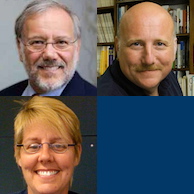Resource Format:
Profile
Resource Description:
Arthur F. Thurnau Professor Brian Coppola (chemistry), professor Joseph Krajcik (education), and lecturer Mary Starr (education) won the Provost's Teaching Innovation Prize in 2009 for their project, Securing Our FUTURE: Foundations for Undergraduate Teaching - Uniting Research and Education.
Original Publication Year:
2011
Resource Title:
TIP Winner: Securing Our FUTURE: Foundations for Undergraduate Teaching - Uniting Research and Education
thumbnail:
Course Type:
All
Academic Area:
Science, Technology, and Math
Discipline:
Chemistry
Faculty Name:
Brian Coppola
Joseph Krajcik
Mary Starr
Related Links:
Previous Innovation
Next Innovation



This program fosters collaboration between first- and second-year undergraduates in LSA gateway science and mathematics courses with local middle and high school teachers. FUTURE gives undeclared undergraduates the chance to design and implement a lesson in an authentic classroom setting, leading many to consider a career in teaching.
Two to three U-M students are matched with an in-service teachers who propose lesson ideas that they’ve previously lacked the resources to carry out. The U-M students visit their host’s classroom and enroll in the FUTURE seminar, which covers practical, ground-level ideas about teaching, learning, and instructional design. Students have access to the ideas and experiences of previous participants, as well as consultation time with LSA and SOE experts (graduate students, post-docs, faculty members).
To date, FUTURE has engaged 30-45 students per semester and15-20 teachers in six schools across five subject areas. These are school districts in which students typically do not succeed in science and mathematics. FUTURE’s impact extends well beyond the delivery of a single lesson as students come to envision U-M as a place for future interactions. Indeed, the program has already had its first instance of a Detroit high school student not only enrolling at U-M, but now being part of a FUTURE teaching team herself.
Student Comments
“I was entrusted with the task of creating a new, exciting, and engaging experience for high school students that I would have direct ownership over. … Meeting weekly with other faculty and student staff from IDEA, I worked through my troubles, celebrated my triumphs, and created what was ultimately a physics-based high school crime scene project that I to this day am proud of.”
“I have had the pleasure of being a part of the FUTURE program all six semesters here so far, and I plan on continuing my senior year as well.”
“I think that many students never even give teaching actual consideration. Most that are talented in the sciences or math tend to go into medical school, or dental school, or become engineers... [I]t really takes a first-hand experience like FUTURE to help give students a well-rounded background to make informed career decisions.”
“Inquiry based learning is something I wish I had a chance to experience in high school. It allows for a way of new thinking: relying on yourself to come up with a solution to a problem.”
“I realized that being passionate about science did not limit me to just a career in medicine, as I previously thought. What I saw through FUTURE was that I could translate my passion into an effective teaching tool and impart that same passion in younger students in my community.”
Above photos from left to right:
Brian Coppola (Chemistry)
Joseph Krajcik (Science Education)
Mary Starr (Education)





